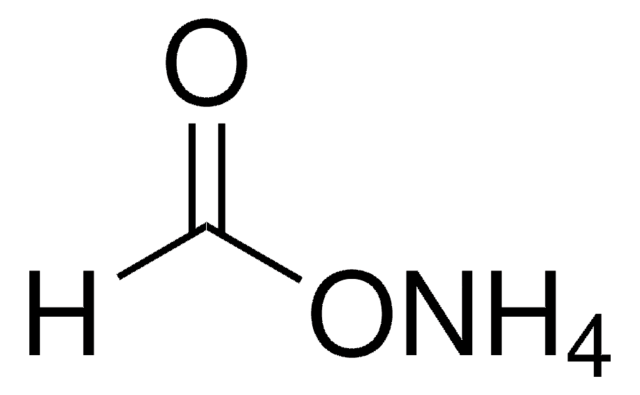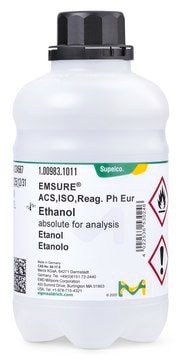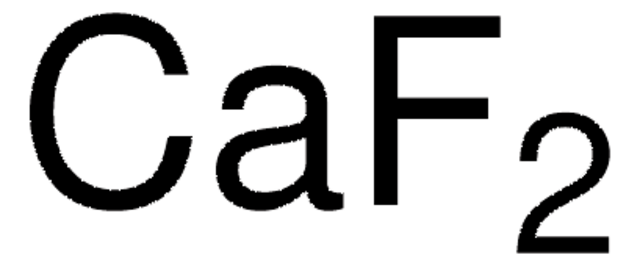1.01164
Ammonium fluoride
for analysis EMSURE® ACS
Synonym(s):
Ammonium fluoride, Fluoroammonium
About This Item
Recommended Products
grade
ACS reagent
Quality Level
product line
EMSURE®
Assay
≥98.0% (NH4F basis, precipitation titration)
form
solid
impurities
≤0.005% Insoluble matter
≤0.5% Ammonium hydrogen difluoride
≤5% Water
ign. residue
≤0.01%
pH
6 (20 °C, 50 g/L in H2O)
solubility
820 g/L
density
1.01 g/cm3 at 20 °C
bulk density
250‑350 kg/m3
anion traces
chloride (Cl-): ≤0.001%
hexafluorosilicate (SiF62-): ≤0.1%
sulfate (SO42-): ≤0.005%
cation traces
Fe: ≤0.0005%
K: ≤0.002%
Na: ≤0.002%
heavy metals (as Pb): ≤0.0005%
storage temp.
15-25°C
InChI
1S/2FH.H3N/h2*1H;1H3
InChI key
KVBCYCWRDBDGBG-UHFFFAOYSA-N
Looking for similar products? Visit Product Comparison Guide
Application
- Ammonium Fluoride in Analytical Chemistry: Ammonium fluoride is extensively used in chromatographic analyses as demonstrated in the synthesis of bifunctional magnetic polymers for the pretreatment and determination of specific metabolites in plasma samples, enhancing both the selectivity and sensitivity of the detection processes (Sun et al., 2024).
- Silica Synthesis: The compound is used in the activation mechanism for the synthesis of hydrated silica from industrial waste, showcasing its role in promoting environmental sustainability and material recovery (Duan et al., 2024).
- Energy Storage Materials: In the field of energy storage, ammonium fluoride acts as a structuring agent in the systematic design of single metal compounds, which are crucial for developing advanced battery technologies (Kuo et al., 2023).
- Environmental Safety and Photocatalysis: It also finds application in environmental safety and photocatalytic processes, where it is used to enhance the photocatalytic activity of materials for biomass conversion and CO2 reduction, contributing to cleaner energy solutions (Liu et al., 2023).
Linkage
Analysis Note
Ammonium hydrogen difluoride (NH₄HF₂): ≤ 0.5 %
Chloride (Cl): ≤ 0.001 %
Hexafluorosilicate (SiF₆): ≤ 0.1 %
Sulfate (SO₄): ≤ 0.005 %
Heavy metals (as Pb): ≤ 0.0005 %
Fe (Iron): ≤ 0.0005 %
K (Potassium): ≤ 0.002 %
Na (Sodium): ≤ 0.002 %
Water: ≤ 5 %
Insoluble matter: ≤ 0.005 %
Residue on ignition: ≤ 0.01 %
Conform to ACS
Legal Information
Signal Word
Danger
Hazard Statements
Precautionary Statements
Hazard Classifications
Acute Tox. 3 Dermal - Acute Tox. 3 Inhalation - Acute Tox. 3 Oral
Storage Class Code
6.1D - Non-combustible acute toxic Cat.3 / toxic hazardous materials or hazardous materials causing chronic effects
WGK
WGK 1
Flash Point(F)
does not flash
Flash Point(C)
does not flash
Certificates of Analysis (COA)
Search for Certificates of Analysis (COA) by entering the products Lot/Batch Number. Lot and Batch Numbers can be found on a product’s label following the words ‘Lot’ or ‘Batch’.
Already Own This Product?
Find documentation for the products that you have recently purchased in the Document Library.
Protocols
Photometric determination using the Silicon molybdenum blue method subsequent to fusion melting
Our team of scientists has experience in all areas of research including Life Science, Material Science, Chemical Synthesis, Chromatography, Analytical and many others.
Contact Technical Service







